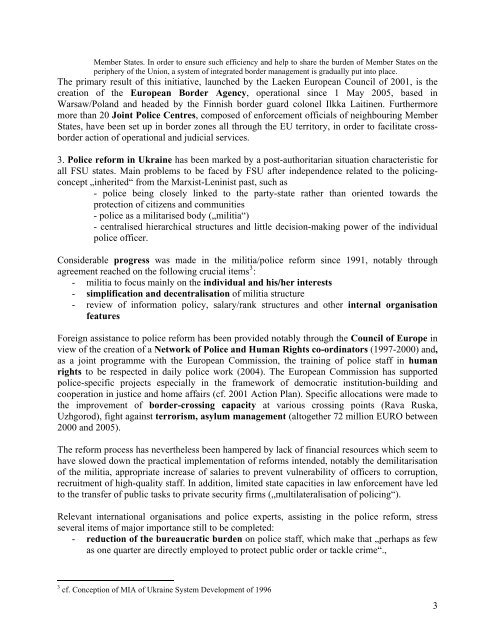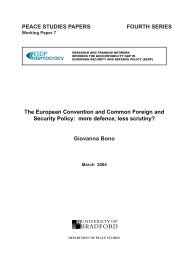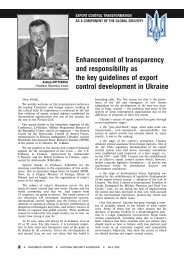Kharkov Police Academy (13 - DCAF
Kharkov Police Academy (13 - DCAF
Kharkov Police Academy (13 - DCAF
Create successful ePaper yourself
Turn your PDF publications into a flip-book with our unique Google optimized e-Paper software.
Member States. In order to ensure such efficiency and help to share the burden of Member States on the<br />
periphery of the Union, a system of integrated border management is gradually put into place.<br />
The primary result of this initiative, launched by the Laeken European Council of 2001, is the<br />
creation of the European Border Agency, operational since 1 May 2005, based in<br />
Warsaw/Poland and headed by the Finnish border guard colonel Ilkka Laitinen. Furthermore<br />
more than 20 Joint <strong>Police</strong> Centres, composed of enforcement officials of neighbouring Member<br />
States, have been set up in border zones all through the EU territory, in order to facilitate crossborder<br />
action of operational and judicial services.<br />
3. <strong>Police</strong> reform in Ukraine has been marked by a post-authoritarian situation characteristic for<br />
all FSU states. Main problems to be faced by FSU after independence related to the policingconcept<br />
„inherited“ from the Marxist-Leninist past, such as<br />
- police being closely linked to the party-state rather than oriented towards the<br />
protection of citizens and communities<br />
- police as a militarised body („militia“)<br />
- centralised hierarchical structures and little decision-making power of the individual<br />
police officer.<br />
Considerable progress was made in the militia/police reform since 1991, notably through<br />
agreement reached on the following crucial items 3 :<br />
- militia to focus mainly on the individual and his/her interests<br />
- simplification and decentralisation of militia structure<br />
- review of information policy, salary/rank structures and other internal organisation<br />
features<br />
Foreign assistance to police reform has been provided notably through the Council of Europe in<br />
view of the creation of a Network of <strong>Police</strong> and Human Rights co-ordinators (1997-2000) and,<br />
as a joint programme with the European Commission, the training of police staff in human<br />
rights to be respected in daily police work (2004). The European Commission has supported<br />
police-specific projects especially in the framework of democratic institution-building and<br />
cooperation in justice and home affairs (cf. 2001 Action Plan). Specific allocations were made to<br />
the improvement of border-crossing capacity at various crossing points (Rava Ruska,<br />
Uzhgorod), fight against terrorism, asylum management (altogether 72 million EURO between<br />
2000 and 2005).<br />
The reform process has nevertheless been hampered by lack of financial resources which seem to<br />
have slowed down the practical implementation of reforms intended, notably the demilitarisation<br />
of the militia, appropriate increase of salaries to prevent vulnerability of officers to corruption,<br />
recruitment of high-quality staff. In addition, limited state capacities in law enforcement have led<br />
to the transfer of public tasks to private security firms („multilateralisation of policing“).<br />
Relevant international organisations and police experts, assisting in the police reform, stress<br />
several items of major importance still to be completed:<br />
- reduction of the bureaucratic burden on police staff, which make that „perhaps as few<br />
as one quarter are directly employed to protect public order or tackle crime“.,<br />
3 cf. Conception of MIA of Ukraine System Development of 1996<br />
3
















